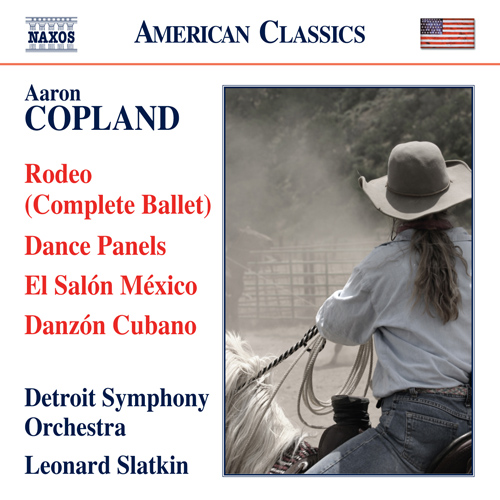COPLAND, A.: Rodeo / Dance Panels / El salon Mexico / Danzon cubano (Detroit Symphony, Slatkin)
While Copland’s hugely successful celebration of the American West, Rodeo, has become an American classic, Dance Panels is barely known despite working beautifully as a concert work. Based on popular Mexican melodies, the glittering, even exotic El Salón Mexico is one of Copland’s most frequently performed works. Of his rhythmically complex Danzón Cubano, inspired by a visit to a dance hall in Cuba, in which there were two orchestras playing at both ends, the composer himself wrote: “I did not attempt to reproduce an authentic Cuban sound but felt free to add my own touches of displaced accents and unexpected silent beats.” GRAMMY® Award-winning conductor Leonard Slatkin’s recording of Copland’s Lincoln Portrait (8.559373–74) received “the kind of performance that brought tears to my eyes” (Audiophile Audition).
The Detroit Symphony Orchestra (DSO) is known for trailblazing performances, collaborations with the world’s foremost musicians, and a deep connection to its city. In January 2020, Jader Bignamini was named Music Director, commencing from the 2020–21 season. Leonard Slatkin, who concluded a decade-long tenure at the helm in 2018, now serves as Music Director Laureate. Jeff Tyzik is the orchestra’s Principal Pops Conductor, and Terence Blanchard holds the Fred A. and Barbara M. Erb Jazz Creative Director Chair.
Making its home at Orchestra Hall within the Max M. and Marjorie S. Fisher Music Center, the DSO’s schedule features Classical, PNC Pops, Paradise Jazz, and Young People’s Family Concert series. The orchestra also presents the William Davidson Neighborhood Concert Series, as well as multi-genre performances at The Cube. In 1922 the DSO became the first orchestra to present a radio broadcast and continues today with the free Live from Orchestra Hall webcast series.
With growing attendance and philanthropic support, the DSO pursues a mission to inspire individuals, families, and communities through music.
For more information, visit www.dso.org.


Internationally acclaimed conductor Leonard Slatkin is Music Director Laureate of the Detroit Symphony Orchestra (DSO), Directeur Musical Honoraire of the Orchestre National de Lyon (ONL), and Conductor Laureate of the St. Louis Symphony Orchestra. He maintains a rigorous schedule of guest conducting throughout the world and is active as a composer, author, and educator. Slatkin has received six GRAMMY awards and 35 nominations.
One of his recent recordings is the world premiere of Alexander Kastalsky’s Requiem for Fallen Brothers commemorating the 100th anniversary of the armistice ending World War I. Other recent Naxos releases include works by Saint-Saëns, Ravel, and Berlioz (with the ONL) and music by Copland, Rachmaninov, Borzova, McTee, and John Williams (with the DSO). In addition, he has recorded the complete Brahms, Beethoven, and Tchaikovsky symphonies with the DSO (available online as digital downloads).
A recipient of the prestigious National Medal of Arts, Slatkin also holds the rank of Chevalier in the French Legion of Honor. He has received the Prix Charbonnier from the Federation of Alliances Françaises, Austria’s Decoration of Honor in Silver, the League of American Orchestras’ Gold Baton Award, and the 2013 ASCAP Deems Taylor Special Recognition Award for his debut book, Conducting Business. A second volume, Leading Tones: Reflections on Music, Musicians, and the Music Industry, was published by Amadeus Press in 2017. His latest book, Classical Crossroads: The Path Forward for Music in the 21st Century (2021), is available through Rowman & Littlefield.
Slatkin has conducted virtually all the leading orchestras in the world. As Music Director, he has held posts in New Orleans; St. Louis; Washington, DC; London (with the BBC Symphony Orchestra); Detroit; and Lyon, France. He has also served as Principal Guest Conductor in Pittsburgh, Los Angeles, Minneapolis, and Cleveland.

The son of immigrant Jewish parents from Poland and Lithuania, Aaron Copland was born in Brooklyn in 1900 and lived to become the doyen of all American composers. He studied with Nadia Boulanger in Paris. His wider popular reputation in the United States was founded on his thoroughly American ballets—Billy the Kid, Rodeo and Appalachian Spring—and, less overtly, on his film scores, while a great variety of other compositions won him an unassailable position in American concert life.
Ballet Music
Copland’s three ballets Billy the Kid, Rodeo and Appalachian Spring are quintessentially American, the first two dealing with familiar elements of the Wild West and the third turning to Shaker country in the farmlands of Appalachia. All three works are well known also in the concert hall.
Orchestral Music
Unquestionably the best known of all Copland’s orchestral works must be Fanfare for the Common Man, followed by An Outdoor Overture, El salón Mexico and Quiet City, the last originally incidental music for a play by Irving Shaw.
Piano Music
Copland’s piano music covers much of his creative life, from the Humoristic Scherzo: The Cat and the Mouse, after La Fontaine, of 1920 to Night Thoughts, A Homage to Ives and the final Proclamation of 1973.































